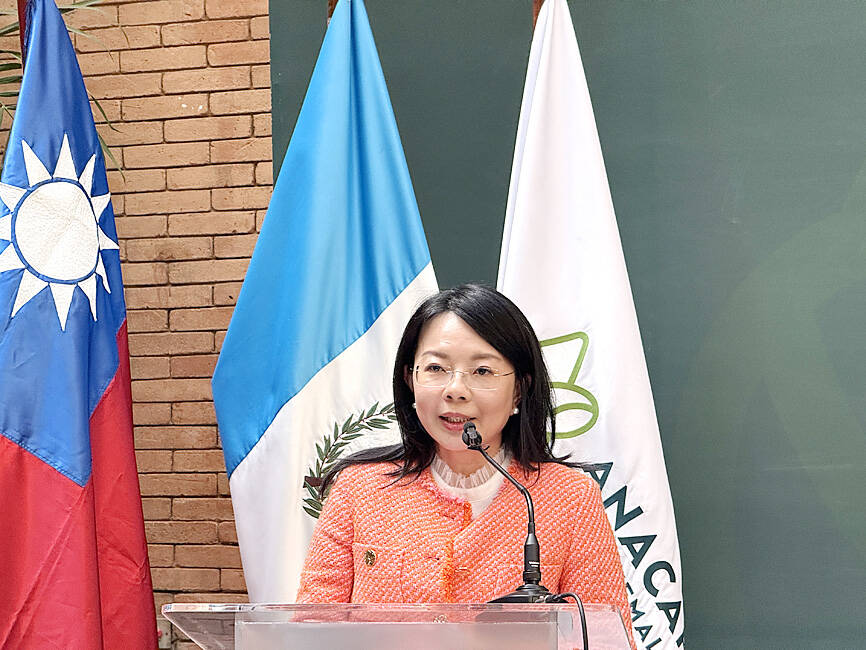A group of Taiwanese coffee importers plans to purchase 720 tonnes of coffee beans from Guatemala this year, up nearly 50 percent from last year, Central America Trade Office director Violeta Hsu (徐韶慧) said on Monday.
Thirteen Taiwanese businesses are participating in the Central America Coffee Economic and Trade Inspection Group that the office organized, said Hsu, who is heading the delegation.
Established in 1997, the office focuses on trade relations and promotions between Taiwan and its Central American allies. The office is supported by a development fund, which is managed by board directors consisting of the foreign ministers of Taiwan and the other nations involved.

Photo: CNA
The firms that are represented in the group are to procure enough coffee to fill 38 shipping containers as a result of the trip, which has included visits arranged by Guatemala’s National Coffee Association, she said.
“This shows Taiwanese consumers’ love for Guatemalan coffee, and highlights the abundant business opportunities between Taiwan and Guatemala,” she said.
Coffee beans from Guatemala accounted for more than 10 percent of Taiwan’s coffee consumption, making the country Taiwan’s fourth-largest coffee importer, she said.
The group visited Guatemala’s high-altitude Huehuetenango region to observe production processes from planting to roasting, and meet with local people involved in farming, processing and exporting the commodity, the office said.
In May last year, China announced a ban on imports of macadamia nuts and coffee beans from Guatemala, a move viewed as economic pressure intended to persuade the Central American nation to cut diplomatic ties with Taipei in favor of Beijing.
Guatemala is a diplomatic ally of Taiwan.
In response, Taipei promoted imports of Guatemalan coffee to help its diplomatic ally mitigate the effects of Beijing’s actions.
Guatemalan coffee imports last year exceeded US$18 million, up 13 percent from 2023, Bank of Guatemala data showed.
Coffee is the country’s second-largest export product to Taiwan, following sugar, the data showed.
Guatemalan Vice Minister of Foreign Affairs Julio Eduardo Orozco Perez thanked Taiwan for its assistance countering Chinese “economic coercion” during an official visit to Taipei in August last year.

The manufacture of the remaining 28 M1A2T Abrams tanks Taiwan purchased from the US has recently been completed, and they are expected to be delivered within the next one to two months, a source said yesterday. The Ministry of National Defense is arranging cargo ships to transport the tanks to Taiwan as soon as possible, said the source, who is familiar with the matter. The estimated arrival time ranges from late this month to early next month, the source said. The 28 Abrams tanks make up the third and final batch of a total of 108 tanks, valued at about NT$40.5 billion

A group from the Taiwanese Designers in Australia association yesterday represented Taiwan at the Midsumma Pride March in Melbourne. The march, held in the St. Kilda suburb, is the city’s largest LGBTQIA+ parade and the flagship event of the annual Midsumma Festival. It attracted more than 45,000 spectators who supported the 400 groups and 10,000 marchers that participated this year, the association said. Taiwanese Designers said they organized a team to march for Taiwan this year, joining politicians, government agencies, professionals and community organizations in showing support for LGBTQIA+ people and diverse communities. As the first country in Asia to legalize same-sex

Travel agencies in Taiwan are working to secure alternative flights for travelers bound for New Zealand for the Lunar New Year holiday, as Air New Zealand workers are set to strike next week. The airline said that it has confirmed that the planned industrial action by its international wide-body cabin crew would go ahead on Thursday and Friday next week. While the Auckland-based carrier pledged to take reasonable measures to mitigate the impact of the workers’ strike, an Air New Zealand flight arriving at Taipei from Auckland on Thursday and another flight departing from Taipei for Auckland on Saturday would have to

MOTIVES QUESTIONED The PLA considers Xi’s policies toward Taiwan to be driven by personal considerations rather than military assessment, the Epoch Times reports Chinese President Xi Jinping’s (習近平) latest purge of the Chinese People’s Liberation Army (PLA) leadership might have been prompted by the military’s opposition to plans of invading Taiwan, the Epoch Times said. The Chinese military opposes waging war against Taiwan by a large consensus, putting it at odds with Xi’s vision, the Falun Gong-affiliated daily said in a report on Thursday, citing anonymous sources with insight into the PLA’s inner workings. The opposition is not the opinion of a few generals, but a widely shared view among the PLA cadre, the Epoch Times cited them as saying. “Chinese forces know full well that